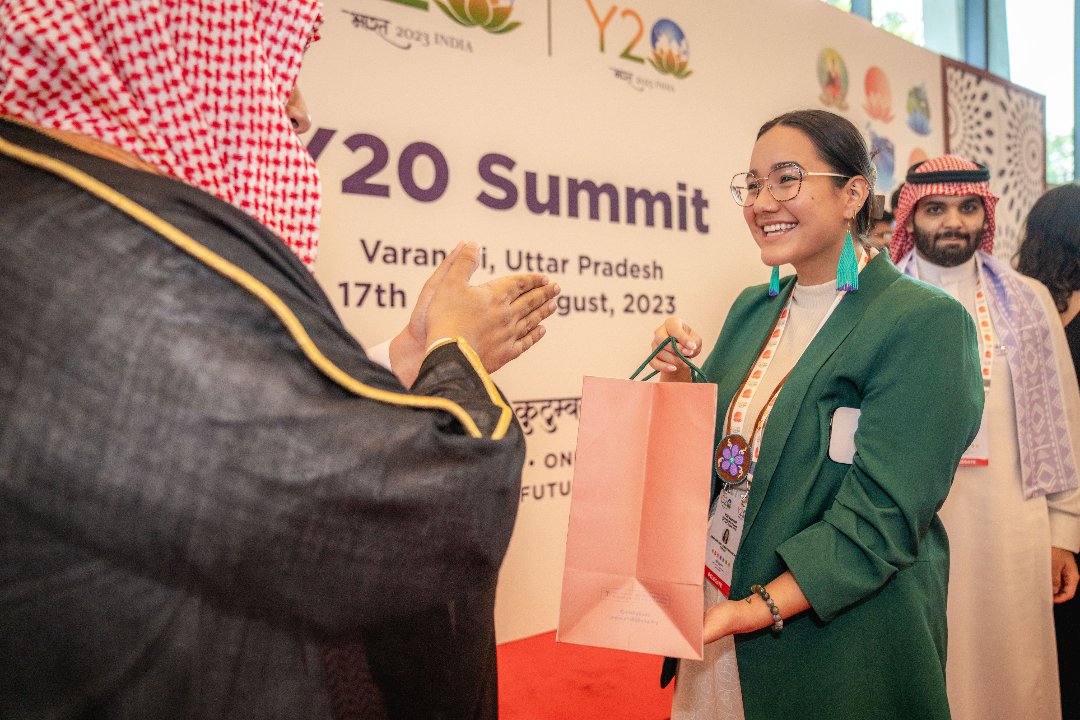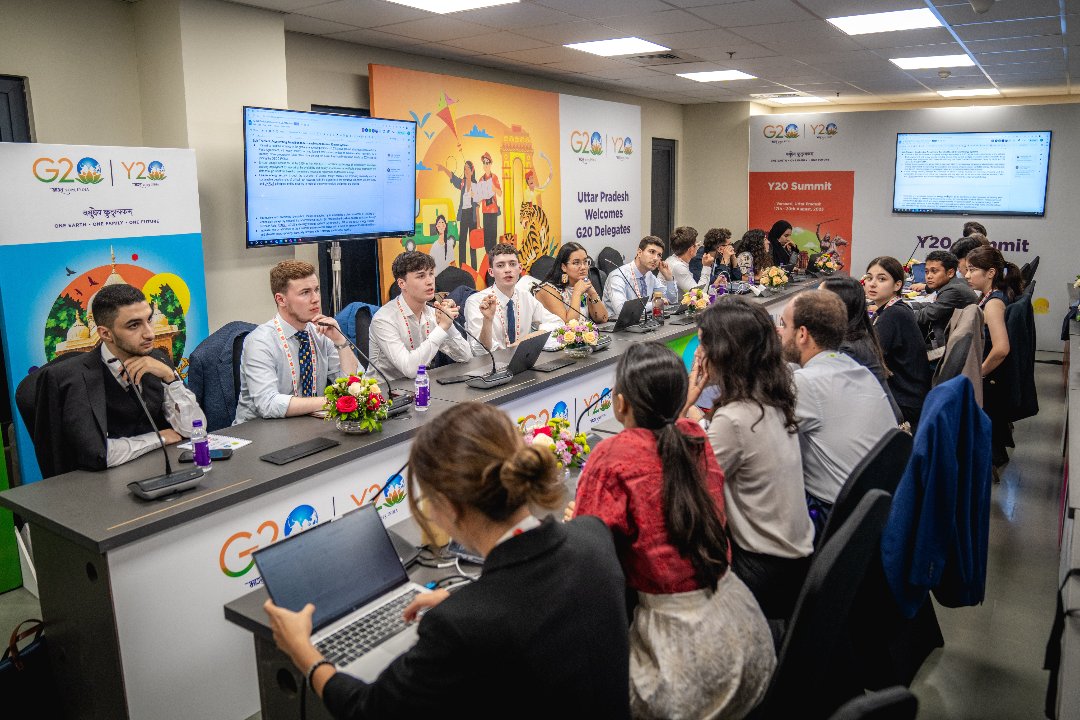
SENS student Laliberte-Pewapisconias represents Canada at Y20 Summit
A University of Saskatchewan (USask) scholar adds valuable Indigenous perspective to work on climate change and disaster risk reduction.
By Paul Sinkewicz for the School of Environment and SustainabilityAubrey-Anne Laliberte-Pewapisconias is a small-town girl who recently found herself with a big voice on the world stage.
In the second year of her Master of Sustainability in Energy Security program at USask, Laliberte-Pewapisconias was one of five youth delegates representing Canada at the Y20 Summit in India in advance of the annual G20 Summit.
Laliberte-Pewapisconias, 24, has her roots in the Canoe Lake Cree First Nation and the Little Pine First Nation. She has been studying at the University of Saskatchewan (USask) School of Environment and Sustainability (SENS), having already earned a Bachelor of Commerce in Finance, a Global Business Stream Certificate, and an Indigenous Governance and Politics Certificate.
During her time at USask, she had been aware of the Young Diplomats of Canada (YDC) program and saw that the 2023 Y20 Summit would be in India, with one of the tracks focused on climate change and disaster risk reduction—topics about which she is passionate. She took a leap of faith, applied to YDC and was selected in March of 2023.
“As a young Indigenous woman, I think sustainability has always been crucial to my identity and to my culture, when it comes to being stewards of the land and protecting Mother Earth,” Laliberte-Pewapisconias said.
As one of five members of the Canadian Y20 Delegation, she first travelled to the pre-summit in April held in Leh, Ladahk, India in the area of India between Pakistan and China. The delegates then conducted Zoom meetings over the spring and summer to discuss the Canadian positions. The main Y20 summit took place in India’s northeast corner, Aug. 17-20, in Varanasi, Uttar Pradesh, India.
The Y20 delegates from around the world formed their recommendations focused on five themes that have implications across all G20 workstreams: Peacebuilding and Reconciliation: Ushering in an Era of No War; Future of Work: Industry 4.0, Innovation and 21st Century Skills; Health, Well-Being and Sports: Agenda for Youth; Climate Change and Disaster Risk Reduction: Making Sustainability a Way of Life; Shared Future: Youth in Governance.
Laliberte-Pewapisconias focused on Climate Change and Disaster Risk Reduction, and that track had different focus areas within it; Accelerating the rise of green energy, transitioning to sustainable living, mitigating disaster risks, climate finance and climate action targets, and action for climate empowerment.
There were many different spaces within that area they had to talk about, including carbon taxes, water protection, biodiversity protection, how to define energy going into the future, as well as action for climate empowerment, which was a sub-theme that the youth delegates added at the summit.
“That meant making sure we looked at women’s rights, the rights of children, and Indigenous peoples’ rights, and different vulnerable communities that we should be looking after,” she said. “We really framed the language in that to underserved communities, and I worked heavily within that sub-theme specifically in terms of Indigenous rights when it comes to climate, so in that space we talked about things like the United Nations Declaration on the Rights of Indigenous Peoples (UNDRIP), and making sure that’s respected across all countries and in all climate policies.”

“Now that the summit is over, we are going to go into post-advocacy, because it can also be framed as a document that shows where the mindset of youth across all G20 member states are at, and what we can be doing to listen to those voices,” she said.
Dr. Karsten Liber (PhD), executive director of the School of Environment and Sustainability, said he thinks the Y20 Summit is a fantastic platform for change.
“I really, truly hope that the G20 leaders actually listen to the recommendations of the youth. Where you start seeing apathy and seeing people giving up is when they feel no one is listening to them.”
“We are in many ways heading toward unsustainable futures on so many fronts. So, we need people who passionately want to make a difference. And most of the people who go into our business don’t go into it for the money and the glory. It’s because they passionately believe the world needs to be a better place and we need to take care of our planet and each other.”
Liber said that as a school, SENS has set its priorities to tackle some of the great challenges that we face as a planet, including climate change, sustainability, water security and food security, energy security, and pollution.
“We’re really trying to educate, train, move forward the next generation of individuals to help work in these spaces and really step up and maybe do something that our generation failed to do,” he said.
The Canadian delegation is also now working on engagement sessions reporting back to the groups with whom they consulted prior to going to the Y20. There will also be open webinars to explain what they advocated for as a Canadian delegation throughout the process. They will also be meeting with different leaders within the Canadian government to show them where they stand as youth who did consultations across the country and what it can mean for them to listen and hear about the work done.
“We are also going to create a final report on what exactly were the target areas for us, and where youth across the world are standing on our different track themes,” said Laliberte-Pewapisconias.
The Y20 delegates working on climate change and disaster risk reduction will continue doing advocacy work at things like COP28 in the United Arab Emirates in early December, as well as through international webinars for the next several months, she said.
“It’s honestly been incredible. There wasn’t much Indigenous representation at the G20 in general, and at the youth summit there weren’t many Indigenous voices present,” said Laliberte-Pewapisconias. “There were many people who advocated for Indigenous voices, and advocated for Indigenous inclusion, but when it came down to it, it was mostly me who people spoke to all the time. So, it was really cool to see how we need Indigenous voices at the table and that there’s needs to have diversity in these spaces or else we won’t have conclusions that are actually feasible for all communities, or that are representative of what we need in different communities.”
Laliberte-Pewapisconias was doing this work at the same time weather systems were going crazy in Canada and around the world. She had a friend in British Columbia forced to evacuate his community due to a wildfire at the exact time she was negotiating about climate change.
But that didn’t leave her feeling defeated.
“Overall, I’m extremely hopeful, in the sense that I’ve now heard from youth from across the world on what they did in their consultations and what they brought to the table in negotiations, and I think all of us are extremely ambitious on what we want to see when it comes to climate action.”
“All of us are actively on the front lines of many movements within our countries, and so I’m hopeful when I look at the youth, and I’m hopeful when I look at Indigenous peoples and the solutions we have to care for Mother Earth.”
She said you do have to look at what some of the leaders are doing, as well, and realize that we are not being as ambitious as we could be.
“There are definitely days where I am pessimistic, and that climate anxiety is very prevalent, but when I look to the youth, that’s when I find my hope.”
The result of Laliberte-Pewapisconias’ work on the Climate Change and Disaster Risk Reduction track can be seen in the final Y20 India 2023 Communiqué.
The communiqué begins with 16 proposals, of which three of the first five focus on climate change, sustainability and environmental education (see below). The communiqué calls for national climate assemblies in each G20 member nation so that a pool of their citizens can learn about the climate and environmental crises from independent experts and deliberate on the effects of these on their lives so they can provide effective climate policy recommendations, to be adopted by their government, and more broadly foster democratic spaces for citizen participation.
The section of the report authored by Laliberte-Pewapisconias’ track was titled Climate Change and Disaster Risk Reduction: Making Sustainability a Way of Life. In it, there are seven proposals under the topic of Transition to Sustainable Living, five recommendations under Mitigating Disaster Risks, seven points under Accelerating Transition to Sustainable and Cleaner Energy Systems, and seven more in each of Climate Finance and Climate Action Targets and Action for Climate Empowerment.
https://y20india.in/wp-content/uploads/2023/08/Y20_Communique-digital-web.pdf
Together we will support and inspire students to succeed. We invite you to join by supporting current and future students' needs at USask.

